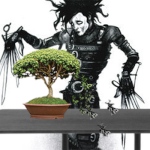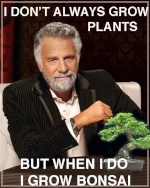A plant physiology question...
+5
JimLewis
Poink88
lordy
Kev Bailey
my nellie
9 posters
Page 1 of 1
 A plant physiology question...
A plant physiology question...
I know that we let the apical shoot to extend and grow free in order to gain more girth on the branches.
My question is : If we decrease the length of a branch (i.e. cut back to a certain point) and let the next shoot to extend and grow free as a new leader for this branch, will this procedure also add girth to the branch in question?
Thank you!
My question is : If we decrease the length of a branch (i.e. cut back to a certain point) and let the next shoot to extend and grow free as a new leader for this branch, will this procedure also add girth to the branch in question?
Thank you!

my nellie- Member
 Re: A plant physiology question...
Re: A plant physiology question...
Yes it will, eventually. Just slows the process down a little.

Kev Bailey- Admin
 Re: A plant physiology question...
Re: A plant physiology question...
I believe the added girth will only occur before the branch that is let grow. In other words, if a sacrificial branch is allowed to grow on another branch, the host will only gain size from the trunk to the sacrificial branch. The trunk itself will also benefit to a lesser degree.

lordy- Member
 Re: A plant physiology question...
Re: A plant physiology question...
Sorry but I disagree. Trees need to support everything above it and they build that from bottom up and inside out. Unless the tree is sick or damaged...everything that is built on the branches (primary, secondary, etc.) will have a proportionate impact to the main branch and eventually the trunk.lordy wrote:I believe the added girth will only occur before the branch that is let grow. In other words, if a sacrificial branch is allowed to grow on another branch, the host will only gain size from the trunk to the sacrificial branch. The trunk itself will also benefit to a lesser degree.

Poink88- Member
 Re: A plant physiology question...
Re: A plant physiology question...
Me too. The more side branches you get on your sacrifice branch, the fatter that branch gets. The fatter that branch gets, the fatter the trunk gets. it is cumulative. That's why you should snip off the growing tip of the sacrifice branch every so often -- to promote side branches.

JimLewis- Member
 Re: A plant physiology question...
Re: A plant physiology question...
Perhaps I didnt explain myself clearly. I meant that the portion of the host branch that is beyond the sacrifice, or trunk if the sacrifice is off the trunk, will not develop as rapidly as the portion between the sac. branch and the trunk. The tip of the host branch wont gain as much benefit as will the part between the trunk and the sac. because there isnt as much there to draw nutrients to it. If that is incorrect I must have misinterpreted the article I read.JimLewis wrote:Me too. The more side branches you get on your sacrifice branch, the fatter that branch gets. The fatter that branch gets, the fatter the trunk gets. it is cumulative. That's why you should snip off the growing tip of the sacrifice branch every so often -- to promote side branches.

lordy- Member
 Re: A plant physiology question...
Re: A plant physiology question...
Lordy, Jim used the perfect term...CUMULATIVE. It doesn't matter if the branch is secondary, tertiary, etc....they will all contribute in fattening the trunk. Of course there are a few exceptions to this but most plant will behave this way.

Poink88- Member
 Re: A plant physiology question...
Re: A plant physiology question...
I get what you both are saying. What I am trying to point out is that the position of the sacrifice will determine where the more rapid thickening stops. Not saying that the point beyond the sacrifice doesnt contribute or anything like that.Poink88 wrote:Lordy, Jim used the perfect term...CUMULATIVE. It doesn't matter if the branch is secondary, tertiary, etc....they will all contribute in fattening the trunk. Of course there are a few exceptions to this but most plant will behave this way.

lordy- Member
 Re: A plant physiology question...
Re: A plant physiology question...
Lordy you are 100%correct, it all has to do with the terms proximal and distal. Jim and poik, sure the WHOLE tree will grow more if there is more foliage because the root system would be larger but that growth that is sent back up the trunk is evenly distributed. There is 2 points to having sacrifice limbs coming off of your branches. One is that it enables you (depending where on your branch you place them) to thicken only the parts along the branch that are between the sacrifice limb and the nebari to thicken. I will encourage multiple sacrifice limbs on my main branches to quickly build heavy yet TAPERED thickness. The second point is that by letting the sacrifice limb come off the branch before you get to the end of the branch, you are able to build ramification while at the same time thickening your limbs incredibly and with taper (even if it is field grown). I wished Tom Scott was not in his late 80s and used the internet. He has been doing this to 100s of tridents since the early 1960s. when his trees trees come out of the ground they have amazing taper, size, and ramification, and in the same amount of time that others often only produce a stump. Its all about being very careful on where sacrifice limbs are started and hes really taught me that field growing is not just planting a tree and walking away for several years, there really is a lot of thought that can be put into it.

bucknbonsai- Member
 Re: A plant physiology question...
Re: A plant physiology question...
Seems to me that everyone is assuming there is only ONE sacrifice branch.

JimLewis- Member
 Re: A plant physiology question...
Re: A plant physiology question...
I'm not making that assumption, but the idea I was trying to get across would apply to any and all sacrificial branches, be they main, secondary, whatever. However, the original poster asked this specific question: If we decrease the length of a branch (i.e. cut back to a certain point) and let the next shoot to extend and grow free as a new leader for this branch, will this procedure also add girth to the branch in question? I was simply trying to point out what would and would not gain girth depending on the placement of the sacrifice branch relative to the (nebari--Thanks Buck).JimLewis wrote:Seems to me that everyone is assuming there is only ONE sacrifice branch.
Over and out.

lordy- Member
 Re: A plant physiology question...
Re: A plant physiology question...
To me it seems it won't matter what kind of branch structure a sacrifice branch has. What matters is the number of leaves it needs to support. That thickness it will add to the trunk.
Glaucus- Member
 Re: A plant physiology question...
Re: A plant physiology question...
Lets clear up a fallacy I think I'm seeing crop up in a few posts above. Trees grow from the top down not from the bottom up. Hence a nail hammered into a tree will remain at exactly the same height always. With this in mind it's easier to understand how taper works.
Every branch thickens the tissues below it (rootwards) proportional to the amount of vascular tissue the branch itself grows and needs in order to support its foliage. A secondary branch will thicken a primary branch from its branch collar down on down. That primary branch will thicken the trunk from its branch collar on down.
So even if a new leader is selected on a primary branch the thickening process will continue proportional to the amount of foliage that newly selected leader grows and the amount of vascular tissue needed to support that foliage..The rate of thickening will however slow down until the new leader grows the same amount of foliage that the father branch it was selected from was originally supporting. Once the new leader exceeds that original amount of foliage the thickening process will proceed at the original (uncut branch) speed.
Its kinda like having one Ostrich egg (uncut branch) or 6 chicken eggs (ramified branches) the amount of egg (vascular tissue) adds up the same.
-Jay
Every branch thickens the tissues below it (rootwards) proportional to the amount of vascular tissue the branch itself grows and needs in order to support its foliage. A secondary branch will thicken a primary branch from its branch collar down on down. That primary branch will thicken the trunk from its branch collar on down.
So even if a new leader is selected on a primary branch the thickening process will continue proportional to the amount of foliage that newly selected leader grows and the amount of vascular tissue needed to support that foliage..The rate of thickening will however slow down until the new leader grows the same amount of foliage that the father branch it was selected from was originally supporting. Once the new leader exceeds that original amount of foliage the thickening process will proceed at the original (uncut branch) speed.
Its kinda like having one Ostrich egg (uncut branch) or 6 chicken eggs (ramified branches) the amount of egg (vascular tissue) adds up the same.
-Jay

drgonzo- Member
 Re: A plant physiology question...
Re: A plant physiology question...
I think we are saying the same thing but from different point of view. I still believe trees grow from ground up...not top down.drgonzo wrote:Lets clear up a fallacy I think I'm seeing crop up in a few posts above. Trees grow from the top down not from the bottom up. Hence a nail hammered into a tree will remain at exactly the same height always. With this in mind it's easier to understand how taper works.
Every branch thickens the tissues below it (rootwards) proportional to the amount of vascular tissue the branch itself grows and needs in order to support its foliage. A secondary branch will thicken a primary branch from its branch collar down on down. That primary branch will thicken the trunk from its branch collar on down.
So even if a new leader is selected on a primary branch the thickening process will continue proportional to the amount of foliage that newly selected leader grows and the amount of vascular tissue needed to support that foliage..The rate of thickening will however slow down until the new leader grows the same amount of foliage that the father branch it was selected from was originally supporting. Once the new leader exceeds that original amount of foliage the thickening process will proceed at the original (uncut branch) speed.
Its kinda like having one Ostrich egg (uncut branch) or 6 chicken eggs (ramified branches) the amount of egg (vascular tissue) adds up the same.
-Jay
I prefer the roadway analogy (because of my job). Where your highway is the trunk and the branches are your streets. The more traffic the highway need to handle, the wider (more lane) it need to be. Number of streets alone does not constitute traffic volume but could be indicative of it.
Last edited by Poink88 on Thu Mar 29, 2012 1:33 am; edited 1 time in total

Poink88- Member
 Re: A plant physiology question...
Re: A plant physiology question...
Poink88 wrote:[
I think we are saying the same thing but from different point of view. I still believe trees grow from ground up...not top down.It is just semantics. You are talking height, we are talking girt.
The only thing that happens from the roots upwards is the movement of fluid in the xylem tissues. Both height AND girth proceed from the branch tips at the top of the tree or at the end of a branch (both apical meristems) downwards. Thats the mechanism involved here in dealing with branch and trunk thickening.
Its a bit counter intuitive. Put another way; the thickness (girth) of the trunk at soil level contributes nothing to the girth of the pencil thick topmost branches, but the pencil thick topmost branches DO contribute to the thickness (girth) of the trunk at soil level. I hope that makes sense
-Jay

drgonzo- Member
 Re: A plant physiology question...
Re: A plant physiology question...
Dario...
if the tree grew from the ground up the perfectly placed bottom branches would get further and further from the soil level. The lower branches stay basically where they are and new ones appear from new growth above. If a low shoot appears from the trunk everything else doesnt move up a few inches.
the more leaves and wood you let grow from any given point means all wood between there and the roots will inclease in mass - simple basic horticulture and the easiest way to taper or fatten certain areas of our trees by design.
cheers Marcus
if the tree grew from the ground up the perfectly placed bottom branches would get further and further from the soil level. The lower branches stay basically where they are and new ones appear from new growth above. If a low shoot appears from the trunk everything else doesnt move up a few inches.
the more leaves and wood you let grow from any given point means all wood between there and the roots will inclease in mass - simple basic horticulture and the easiest way to taper or fatten certain areas of our trees by design.
cheers Marcus

marcus watts- Member
 Re: A plant physiology question...
Re: A plant physiology question...
I know the tree doesn't grow up that way...and as I said it is semantics and we mean the same thing. Same can be said the trees never grow from top down. I've never seen any tree grow downward and push roots deeper because they don't  .... but I understand what you mean.
.... but I understand what you mean.
They simply grow from the top and the bottom (and everything in between) compensate to support it.
They simply grow from the top and the bottom (and everything in between) compensate to support it.

Poink88- Member
 Re: A plant physiology question...
Re: A plant physiology question...
Poink88 wrote: Same can be said the trees never grow from top down.
But they do. That's exactly how trees grow both in height and girth. Vascular tissue are grown from the new growth downwards. And from center outwards.
Poink88 wrote:I've never seen any tree grow downward and push roots deeper because they don't
Tree roots respond to plant hormones called auxins that direct them to grow towards the pull of gravity (positive geotropism) they do indeed grow downward into the soil
Poink88 wrote:They simply grow from the top and the bottom (and everything in between) compensate to support it.
I fear I'm just not explaining this all well enough to you my friend, and it is really very important to understand it accurately. I would recommend you do some independent research into how trees grow.
Best
-Jay

drgonzo- Member
 Re: A plant physiology question...
Re: A plant physiology question...
Uuh drgonzo, you confused him because you misspoke but now you are actually defending exactly that while you must realize that's not right.
Plants have meristem zones which are regions of rapid cell division. They grow new shoots and roots from those areas. Shoots go up, roots go down, generally. Nothing about the plant moves up or down except brand new shoots and roots which are pushed from these meristem areas until these go dormant because the new shoots/roots get their own meristems.
There's plenty of timelapse videos out there that show exactly this. Saying they grow 'from the top down' makes no sense no matter how you try to interpret it.
Then there is the vascular cambium where the trunk grows both inward and outward from the middle.
Plants have meristem zones which are regions of rapid cell division. They grow new shoots and roots from those areas. Shoots go up, roots go down, generally. Nothing about the plant moves up or down except brand new shoots and roots which are pushed from these meristem areas until these go dormant because the new shoots/roots get their own meristems.
There's plenty of timelapse videos out there that show exactly this. Saying they grow 'from the top down' makes no sense no matter how you try to interpret it.
Then there is the vascular cambium where the trunk grows both inward and outward from the middle.
Last edited by Glaucus on Fri Mar 30, 2012 2:09 am; edited 1 time in total
Glaucus- Member
 Re: A plant physiology question...
Re: A plant physiology question...
LOL my bad, I meant the base NOT roots. Of course I know roots go deeper.drgonzo wrote:Poink88 wrote:I've never seen any tree grow downward and push roots deeper because they don't
Tree roots respond to plant hormones called auxins that direct them to grow towards the pull of gravity (positive geotropism) they do indeed grow downward into the soil
By the way, I grew in farms and know plants well enough esp the basics.

Poink88- Member
 Re: A plant physiology question...
Re: A plant physiology question...
Glaucus wrote:Uuh drgonzo, you confused him because you misspoke but now you are actually defending exactly that while you must realize that's not right.
I will be the first to admit I am a poor teacher, hence I advised Dario to seek another source.
what I said was that trees grow in height and in girth in a direction that proceeds from the apical meristems downward towards the root zone. We are after all discussing taper on this thread. I was trying to correct Darios statement that "trees never grow from the top down" Please read the quoted block text in my last post.
The roots tips are the second apical meristem and they grow downwards as you mentioned.
The third major meristem is the vascular cambium which grows from the center of the tree outwards and technically inwards as well. That growth is in response to the top down growth of the provascular tissue in each apical growth tip and proceeds from that growth. I'm sorry to have confused you I should have elaborated further.
There is also a meristem directly under the bark that repairs wounds to the periderm called the cork cambium but that is not really relevant to our discussion.
This is correct to the best of my botanical knowledge. But perhaps I am as wrong about these facts as I was about the nature of soil PH.
-Jay

drgonzo- Member
 Re: A plant physiology question...
Re: A plant physiology question...
I am glad that the question of a beginner (me) has clarified some basic terms and facts.
drgonzo wrote: ... ... it is really very important to understand it accurately. I would recommend you do some independent research into how trees grow... ...
May I suggest the book "Botany For Bonsai - The Science Behind The Art" by Enrique Castaño de la Serna. This is an excellent and eloquent manual.Glaucus wrote:Uuh drgonzo, you confused him ... ...

my nellie- Member
 Re: A plant physiology question...
Re: A plant physiology question...
YAY! A voice of sensibility!May I suggest the book "Botany For Bonsai - The Science Behind The Art" by Enrique Castaño de la Serna. This is an excellent and eloquent manual.

JimLewis- Member
 Similar topics
Similar topics» What plant is this?
» I've had this plant for four years and haven't thought much of it.... until now
» Plant ID please
» More two Caliandras...
» Plant ID please
» I've had this plant for four years and haven't thought much of it.... until now
» Plant ID please
» More two Caliandras...
» Plant ID please
Page 1 of 1
Permissions in this forum:
You cannot reply to topics in this forum






